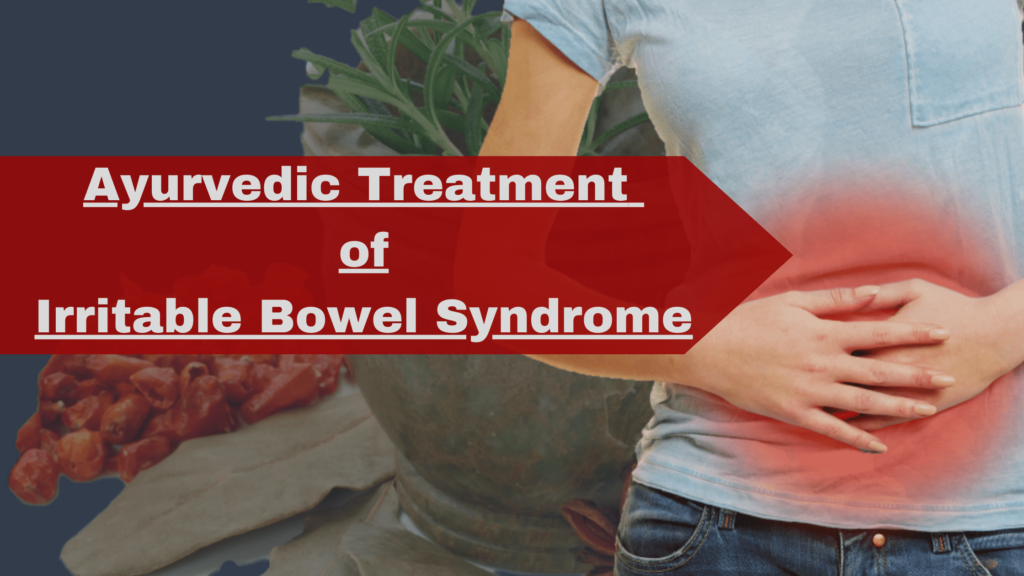Ayurvedic
Irritable Bowel Syndrome Causes, Symptoms and Home Remedies
Irritable Bowel Syndrome:
Ayurvedic IBS Treatment – Irritable Bowel Syndrome (IBS) is described as a long-term or recurrent disorder of gastrointestinal (GI) functioning, and it usually involves the small intestine as well as large intestine (colon) with the make disturbance of intestinal/bowel (gut) motor function (motility) and sensation.
Irritable bowel syndrome (IBS) affects about 10% of the adult population and 70% are women. But, Ayurvedic IBS Treatment – this condition can be managed naturally without any side effects in Ayurveda.
Causes of IBS Irritable Bowel Syndrome:
The exact cause of irritable bowel syndrome is not known, but it is believed to be occurring due to several factors, including alteration in the gastrointestinal (GI) tract movements, imbalance nervous system signals, increased sensitivity to pain, and food intolerance.
Some common causes of IBS are:-
- Abnormal peristalsis movements of the colon and small intestines
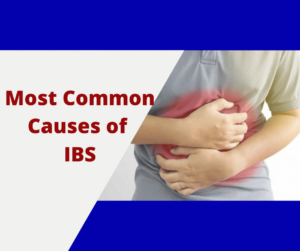
- Food sensitivities, that is possibly caused by poor absorption of sugars or acids in food
- A condition of viral or bacterial infection of the stomach and intestines
- Psychological conditions also play an important role in causing IBS such as anxiety, stress, depression, or any mental stress
- Addiction to smoking, drinking, excess intake of non-veg food
- Hormonal imbalance
- Excess intake of tea and coffee
- Small intestinal bacterial overgrowth (SIBO)
Symptoms of IBS:
A person who is suffering from IBS has to experience some common symptoms like :
- Constipation, or Diarrhea
- Changes in bowel habits
- Severe abdominal pain and cramping, which may reduce after passing a stool
- Heaviness in the abdomen
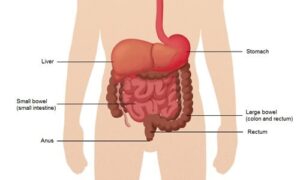
- Hyperacidity
- Sometimes blood or mucus is passed with stool
- Swelling or bloating of the abdomen
- Difficulty swallowing
- Anemia
- Weight loss
- Rectal bleeding
- Unexplained vomiting
Ayurvedic Point of View on Irritable Bowel Syndrome (IBS) Treatment:
In Ayurvedic texts, Irritable bowel syndrome is called Grahani Roga, which indicates the pathological state of function and integrity of the intestinal tract (mostly small intestine), known as GRAHANI.
Grahani roga is considered one among the eight MAHA GADHAS (Diseases, which are difficult to treat).
According to the Ayurvedic Acharyas, there is always an inter-relationship between avayava (organ) and avayavi (part of the organ) or can say ashraya (seat) and ashrayi (seated). Either of the ones has an impact on the other. Grahani is a seat of Jatharagni and Agni is responsible for Ayu (longevity of life), Vrana (complexion), Bala (strength), Sawsthya (health), Upacahya (proper metabolism), Prabha (glow), Oja (core energy), etc.
Hence, Prakriti agni (normal functioning of digestion power) is very essential for a long, and disease-free life, while vitiated agni is responsible for Roga avastha (formation of disease).
दुर्बलो विदहत्यन्नं तद्यात्यूर्ध्वमधोऽपि वा
Hence, Durbala agni (weak digestive system) results in the partial digestion of the food which in turn converts it into ama (toxins) and this enters in circulation and moves either in an upward or downward direction and result in the formation of various diseases.
Causes of Irritable Bowel Syndrome (IBS) According to the Ayurveda:
In Ayurvedic texts, it was mentioned that every disease occurs due to disturbance in the Agni (digestive fire), and it can lead to the formation of ama in the body.
The most common causes are given below:
- Eating a high amount of food before the digestion of previous food
- Excessive intake of food (ati bhojana)
- Improper habit of food (vishama bhojana)
- Unwholesome food (asatmya bhojana)
- Regular intake of heavy, oily, fried food (guru bhojana)
- Cold food intake (sheeta bhojana)
- Intake high amount of Dry food (rooksha ahara)
- Contaminated food intake (dushta bhojana)
- Grief (shoka)
- Excess anger (krodha)
- Regular intake of contra-indicated food like fruits & milk, fish & milk, etc
- Fear (bhaya)
- Holding up natural urges for a long time like urine, bowels, or vomit and eating
- Lowering of natural resistance and immunity.
Also, according to the dosha, Acharyas mentioned a significant cause:
-
Causes of Vataja Grahani:
कटुतिक्तकषायातिरूक्षशीतलभोजनैः|
प्रमितानशनात्यध्ववेगनिग्रहमैथुनैः||५९||
करोति कुपितो मन्दमग्निं सञ्छाद्य मारुतः|
When a person intake an excessive amount of katu (pungent), tikta (bitter), kshaya (astringent), shushka (dry) food, cold, chilled, or frozen food, eating quantitatively less amount of food, suppression of natural urges, contribute to excessive sexual intercourse, etc., these all lead to the aggravation of Vata dosha which disturbs the functioning of Agni and further causes suppression of Agni.
-
Causes of Pittaja Grahani:
कट्वजीर्णविदाह्यम्लक्षाराद्यैः पित्तमुल्बणम्|
अग्निमाप्लावयद्धन्ति जलं तप्तमिवानलम्||
When a person intake a high amount of katu (spicy), amal (sour), kshara (alkali), and other pitta aggravated food items, taking ajeerna (undigestable food), vidhahi (food that causes eructation) causes aggravation of Pitta dosha and this hampers the function of Agni.
-
Causes of Kaphaja Grahani:
गुर्वतिस्निग्धशीतादिभोजनादतिभोजनात्|
भुक्तमात्रस्य च स्वप्नाद्धन्त्यग्निं कुपितः कफः||
When a person is addicted to having taking heavy, cold, frozen, chilled items, or food having the same qualities as Kapha, sleeping just after the meals, don’t indulge in any physical activities will cause aggravation of the Kapha dosha and simultaneously hamper the functioning of the Agni.
-
Causes of Sannipatja Grahani:
पृथग्वातादिनिर्दिष्टहेतुलिङ्गसमागमे|
त्रिदोषं निर्दिशेत्तेषां भेषजं शृण्वतः परम्
This type occurs by a continuous aggravation of Vata, Pitta, and Kapha dosha.
Symptoms of IBS According to the Ayurveda:
The most common causes that are experienced in IBS are:
पूर्वरूपं तु तस्येदं तृष्णाऽऽलस्यं बलक्षयः|
विदाहोऽन्नस्य पाकश्च चिरात् कायस्य गौरवम्|
- Mild burning sensation (vidaha)
- The sensation of vomiting (chardi)
- The feeling of bloating, distention of abdomen (adhman)
- Excessive salivation (praseka)
- Tastelessness, anorexia (archi)
- Indigestion (annasya chirat paka)
- Excessive thirst (trishna)
- Diminution of strength (bala kshaya)
- Heaviness in the body (gauravam)
Types of Irritable Bowel Syndrome (IBS) According to the Ayurveda:
There are four types of Grahani Roga mentioned in the Ayurveda, which are :
वातात् पित्तात् कफाच्च स्यात्तद्रोगस्त्रिभ्य एव च|
हेतुं लिङ्गं रूपभेदाञ् शृणु तस्य पृथक् पृथक्||५८||
- Vataja Grahani (Constipation predominant grahani): This occurs due to aggravation of the Vata dosha and a person has to suffer from severe abdominal pain, chest pain, intermittent headache, increased frequency of stool, altered bowel habit, distention of the abdomen, etc.
- Pittaja Grahani (Diarrhea predominant grahani): This type is the most common nowadays, and a person experiences hyper acidity, burning sensation, indigestion, belching, etc.
- Kaphaja Grahani (Dysentery predominant grahani): In this type, a person has to experience a sensation of vomiting, stool with mucus, a sensation of incomplete evacuation of the bowel, the heaviness of the abdomen, etc.
- Sannipatja Grahani (Combination of all the three grahani): Sannipatja grahani includes all the three Doshas and this stage is also called Samgrahani.
Pathogenesis of Irritable Bowel Syndrome (IBS) According to Ayurveda:
According to Ayurveda, Grahani is precipitated after Atisara (diarrhea). Because, in that condition, Agni or digestive fire of a person is too weak that isn’t able to digest the heavy foods, and if a person continues takes in – judicious food, or above – mentioned causes, it will lead to vitiation of Agni and damages Grahani organ and sometimes expel digested, or undigested substances. This condition will lead to the Grahani Roga.
Home Remedies & Ayurvedic IBS Treatment:
A person can take some natural home remedies along with Ayurvedic IBS Treatment to overcome the symptoms. We described common ingredients which are easily available and can be used by every individual. The best natural remedies for IBS are:-
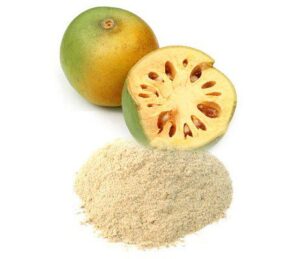 Bilva Fruit: Bilva fruit is used for improving digestion-related problems, and provides relief from nausea, vomiting, improve appetite, and reduces other symptoms associated with IBS.
Bilva Fruit: Bilva fruit is used for improving digestion-related problems, and provides relief from nausea, vomiting, improve appetite, and reduces other symptoms associated with IBS.
How to use: You can take a fresh fruit of Bilva once daily.
Or, also prepared a juice from the ripe fruit of Bilva and drink it once daily.
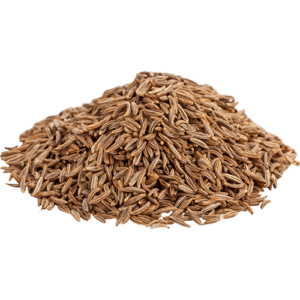 Cumin: Cumin is the best Ayurvedic IBS Treatment & works wonders in reducing the symptoms of IBS. The herb shows antioxidant, anti-inflammatory, carminative, and digestive properties and reduces abdominal pain, cramps, loss of appetite, & poor digestion related to irritable bowel syndrome.
Cumin: Cumin is the best Ayurvedic IBS Treatment & works wonders in reducing the symptoms of IBS. The herb shows antioxidant, anti-inflammatory, carminative, and digestive properties and reduces abdominal pain, cramps, loss of appetite, & poor digestion related to irritable bowel syndrome.
How to use: Add a few cumin seeds in two cups of water. Boil it until the remaining half and strain the mixture & drink this herbal decoction once daily.
Or, you can make a powder of roasted cumin seeds & store it in an air-tight container. Use this powder for cooking purposes or take one teaspoon with lukewarm water.
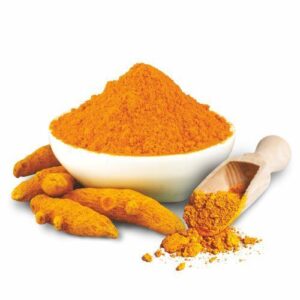 Turmeric: The vibrant yellow color of the Curcuma longa contains a high abundance of anti-inflammatory, anti-oxidant properties. The active constituents in turmeric are highly beneficial in the case of flare-ups and managing abdominal pain, cramps, and discomfort.
Turmeric: The vibrant yellow color of the Curcuma longa contains a high abundance of anti-inflammatory, anti-oxidant properties. The active constituents in turmeric are highly beneficial in the case of flare-ups and managing abdominal pain, cramps, and discomfort.
How to use: Include turmeric in daily purposes via adding it into a specific diet.
It gets absorbed properly and attenuates the various underlying signs and symptoms of IBS.
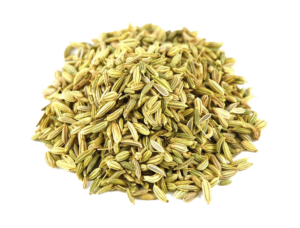 Fennel seeds: Fennel seeds (ayurvedic IBS treatment) are very well-known as anti-inflammatory, analgesic, carminative herbs and also have a distinct taste that aids in digestion. It works as a potent wound healing and contains soothing properties that provide relief from stomach pain, heaviness, bloating, indigestion, flatulence, etc.
Fennel seeds: Fennel seeds (ayurvedic IBS treatment) are very well-known as anti-inflammatory, analgesic, carminative herbs and also have a distinct taste that aids in digestion. It works as a potent wound healing and contains soothing properties that provide relief from stomach pain, heaviness, bloating, indigestion, flatulence, etc.
How to use: Soak a few amounts of fennel seeds in one glass of water overnight, strain it and take the water in the next morning. This remedy is very helpful to ease the pain and prevent various symptoms related to IBS.
Diet and Lifestyle Modifications for Irritable Bowel Syndrome (IBS) Treatment:
The main cause of IBS is excess intake of the wrong diet and our sedentary lifestyle. By eliminating some common causes, a person can prevent the condition from severity, and also reduces the symptoms.
Some Precautions are Given Below:
- Eat freshly cooked food, and also which is light to digest.
- Avoid long intervals between two meals.
- Increase the intake of fresh fruits & vegetables every day.
- Also, take a high amount of jowar/old rice, moongdal, bitter gourd, pumpkin, pomegranate, gooseberry, pudina, turmeric, coriander, cumin seeds, hing, coconut, rock salt, cow ghee, cow milk, fresh buttermilk in daily food to prevent GI diseases.
- Drink little lukewarm water after meals, it helps in the proper digestion of food.
- Walk or do simple exercises for 30-35 min after every meal. This will help to regulate the digestive system and also improves the circulation of blood.
- A person can also do asana for maintaining a healthy digestive system, common asana are: Matsyasana, Pawanmuktasana, Halasana, Suryanamaskar, Mayurasana, Trikonasana, Dhanurasana, Bhujangasana, etc.
- Avoid extremely hot, spicy, sour, salty, fried, greasy food, and also excess intake of tea, coffee, and other carbonated drinks.
- Do medication to avoid excess physical or mental stress and negative attitude.
- Avoid sedentary and irregular lifestyles and also sleeping in the daytime and staying awake till late at night.
- Decrease or avoid the use of smoking, alcohol, and other drugs.
- Avoid or decrease the number of foods with high sugar content, such as chocolate milk, candy, regular soda, and undiluted fruit juice.
Irritable Bowel Syndrome (IBS) Treatment in Ayurveda:
Ayurveda has many wonderful herbs which are very beneficial for the treatment of GI disorders by improving blood circulation to the GI tract, increases immunity, rejuvenates the cells, and balance the proper secretion of the digestive juices.
By managing many patients of acute to chronic cases of IBS, Doctor’s team of “Deep Ayurveda” have made an Ayurvedic package named as “Irritable Bowel Syndrome Ayurvedic Treatment”, which is the best Ayurvedic IBS Treatment that consists a total of five ayurvedic products – Nervocare capsule, Sanjivani vati, Kutajghan vati, Curcumin capsule, and Herbal powder formulation. The Ayurvedic IBS Treatment medicines are made up of pure and natural herbs and are free from any side effects, preservatives, additives, etc.
Brief Description of Products is Given Below for Ayurvedic IBS Treatment:
- Nervocare Herbal Capsule: The capsule is made up of 100% extract of the ayurvedic classical herbs such as jatamansi, vacha, tagar, brahmi, etc. This combination will provide strength to the weak nerves, and also help in rejuvenating the cells of the GI tract.
- Sanjivani Vati : Sanjivani vati is used from ancient time to balance the aggravated doshas and is composed of vacha, pippali, haritaki, vidanga, etc., which helps to eliminate excess toxins from the body and balance Vata and Kapha dosha in the body. It acts as antidiarrheal, antimicrobial, detoxifier, etc which helps in overcome the symptoms of IBS.
- Kutajghan Vati – The tablet is a traditional Ayurvedic medicine that widely used to manage diarrhea, reduces abdominal pain, heaviness, a sensation of nausea, vomiting, etc. The medicine is found to be extremely beneficial in reducing swelling in IBS and stimulates the secretion of digestive juices.
- Curcumin Capsule: In researches, it was proved that curcumin can manage IBS by reducing inflammation, abdominal pain, bloating, heaviness, etc.
- Herbal Powder Formulation: This includes a combination of various ayurvedic classical herbs which are mentioned in Ayurveda texts. This will work wonder in managing IBS naturally by eliminating the harmful toxins from the body and help in maintaining the proper digestion.
Since other pathies have only symptomatic treatment, they just give pain killers and other antibiotics to reduce the symptoms but don’t heal working on root cause. On the other hand, Ayurveda has many herbs that are very effective to reduce the symptoms as well as manage a disease working on its root cause. Every composition is made accordingly to the patient’s condition and the severity of the disease. Hence, heal the disease naturally only, don’t suppress it with chemical-based drugs.
For more detail on Ayurvedic IBS Treatment, please visit our nearest clinic or if you want to consult with our Chief Ayurveda Consultant & Founder – Dr.Baldeep Kour then write with detailed history at info@deepayurveda.com
For regular health updates, please follow our Social Pages

